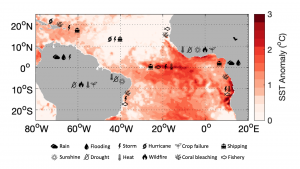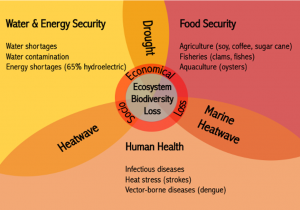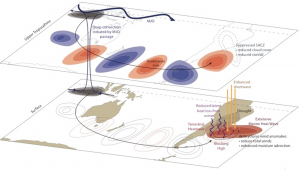Research

Marine heatwaves are extreme events of ocean temperature and have a devastating impact on the marine ecosystem. Our research focuses on understanding the physical mechanisms that generate marine heatwaves in the tropical and South Atlantic and their impacts on climate and ecosystems.

Eastern South America can experience severe droughts in association with heatwaves as well as marine heatwaves in the western South Atlantic. Our research shows that while these multivariate events have the same driver and modulator, they have several different impacts including water and power shortages in southeast Brazil. They can reduce Brazilian soy, coffee and sugarcane production, impacting food supplies globally and increasing worldwide prices. They decrease the production of oysters and the catch of some commercially important fish species, while decimating clams along the southern coast of Brazil. They can affect human health by driving dengue fever outbreaks in urban areas that can increase the number of fatalities. In addition, compound events like this have a disastrous impact on ecosystem degradation and loss of land and marine biodiversity.

Anomalous atmospheric convection over the tropical Indian and Pacific oceans can cause major changes in the global atmospheric circulation. The link between tropical forcing and coherent climate responses over distant regions across the globe are referred to as atmospheric teleconnections. The climate of South America is strongly affected by these teleconnections patterns that emanated mostly from the Pacific and to a lesser extent from the Indian Ocean. Our research tries to understand their variability and impacts on South America.




